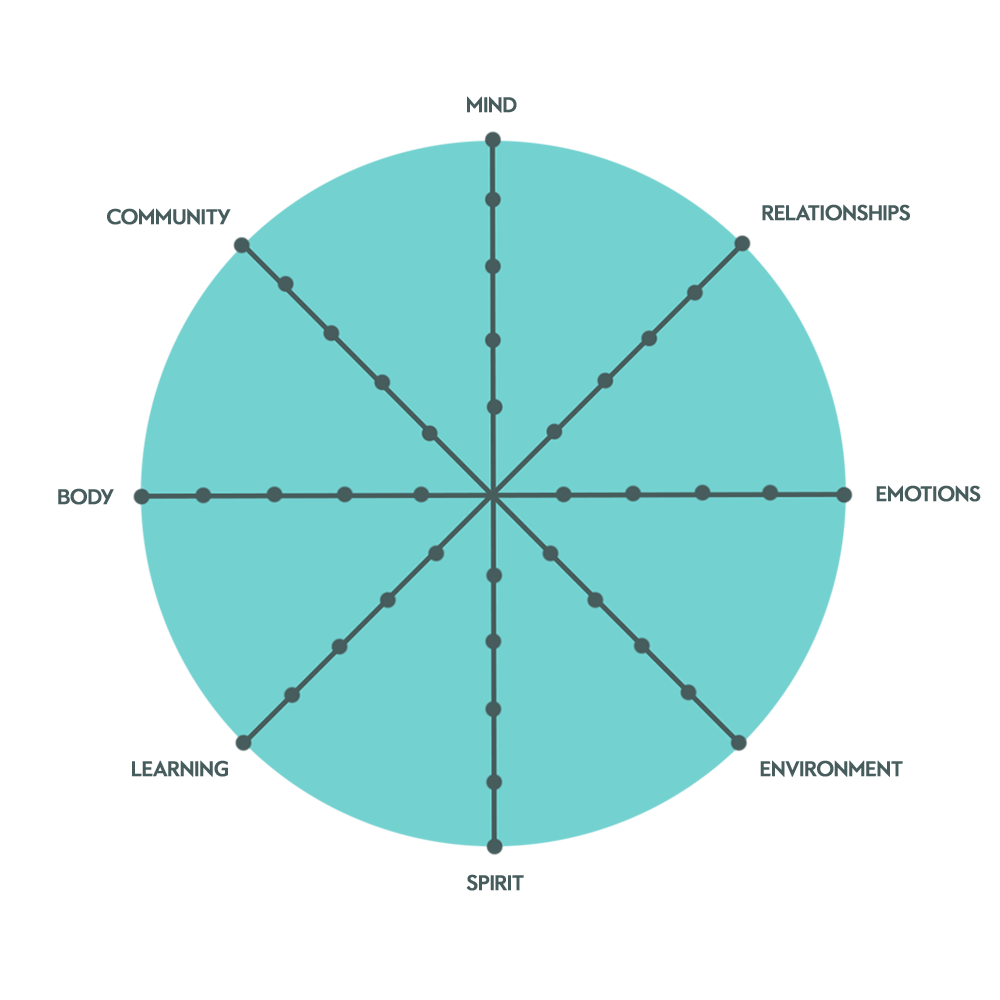Rate your wellbeing using this Wellbeing Wheel
- Overview
- Full article
Looking after our emotional health is a dynamic process and can be influenced by many factors. Understanding and having an awareness of these helps us to recognise how our emotional health may be compromised and allows us to focus on the areas in need of some more dedication.
The Wellbeing Wheel highlights eight areas considered to influence your emotional wellbeing:
- Mind
- Body
- Community
- Learning
- Spirit
- Environment
- Emotions
- Relationships.
Plot your level of wellbeing in each area on a scale of 1–5 (1 being the inner dot on each line) considering the following:
Mind: Think about the clarity of your thoughts, efficiency of your decision-making and your ability to stay focused.
Community: How connected and involved do you feel within your community.
Body: Consider your physical vitality and health. Do you find it easy to relax? Do you experience aches and pains?
Learning: How happy are you with how you are learning new information, skills and awareness in a way that is beneficial to your life?
Spirit: Think about your sense of meaning and purpose in your life. Do you live according to your values?
Environment: Are you happy with all the places/environments that you tend to spend your time in and how they affect you?
Emotions: Do you have a good balance of positive to negative emotions?
Relationships: Consider the quality of your relationships.
DOWNLOAD THE WELLBEING WHEEL

What to do next
Once you've completed your Wellbeing Wheel you will be able to see the areas of wellbeing that you are happiest with, and those that you are least happy with.
This will give you an indication of where to focus your efforts. You can then take actions that help improve these areas of your wellbeing.
Example activities
Mind:
Take a moment to practice this mindful mental focus technique to help you balance your thoughts:
- Focus your attention in the area of the heart. Imagine your breath is flowing in and out of your heart or chest area, breathing a little slower and deeper than usual. Inhale 5 seconds, exhale 5 seconds (or whatever rhythm is comfortable).
Community:
- Find out what local groups you could volunteer some time with, e.g. children’s sports clubs, charity organisations
- Get to know your neighbours
- Donate books or other useful items you don’t want to a local retirement home or hostel.
Body:
- Prioritise your physical recovery by taking extra time to unwind before bed. Turn off the TV, phone and computers for an hour before bed. Read a novel instead
- Take some time to walk in nature
- Drink some water.
Learning:
- Write down one thing you would like to be able to do better, and why. Think of as many options as you can to learn how to do this better – get advice and learn from friends, or find a course you could go on
- Try a MOOC! Massive Online Open Courses offer a huge variety of learning options that you could do in your own space and time.
Spirit:
- Identify your top three values. Write these down. It might help to think of people you admire because of how you see them living their values - these are likely to be values you share
- For each, write one example of how you apply these values in your daily actions and attitudes
- Think about how you could bring your values out even more strongly in your daily life. For any values that are not as present as you would like, write down or talk to a friend about how you could apply these more.
Environment:
- Write down the places where you spend most of your time, work or home for example. Then write down how you tend to think, feel and act because of the environment in these places, and why
- For any area where your environment has a negative impact on you, write down one thing that you could do to help you manage it more effectively (by using one of the tips above on mind or body, for example).
Emotions:
- Take a moment to stop when you feel a positive mood, think about why this was and allow yourself a few moments to fully appreciate the feeling
- Write down your top three things that boost your mood, e.g. time with a friend, a walk at lunch
- Schedule to do each of these at least once over the next week.
Relationships:
- Get in touch with a friend you’ve not spoken to for a while, don’t’ wait. Just do it
- Try a new activity or social event with a friend, the adventure and shared experience will give you both a boost
- Plan some time to sit down and talk with someone important in your life and really find out about how they’re doing.
Last updated Friday 7 October 2022
First published on Monday 24 October 2016

